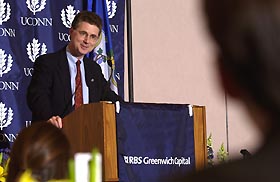|
This is an archived article.
For the latest news, go to the
Advance Homepage
For more archives, go to the Advance Archive/Search Page. | ||
|
Speaker: Bush's Economic Plan The Bush administration's economic stimulus proposal offers long-term fiscal sustainability rather than a quick boost for flagging economic growth, according to the Treasury Department's top financial markets overseer. Democratic lawmakers oppose Bush's plan, warning that its central features - speeding up tax cuts approved in 2001 and eliminating double taxation of stock dividends - offer too little in short-term economic stimulus and would lead to big budget deficits for the foreseeable future.
"The president's plan has been criticized for not being a pure short-term stimulus," said Peter Fisher, under secretary of the U.S. Treasury for domestic policy, in prepared remarks, during this year's RBS Greenwich Capital Economic Seminar on March 10. "Its purpose, however, is not just to deliver a short-term boost to the economy, but to raise the growth rate and boost job creation for the coming decade." Fisher is one of the few non-Republicans in the Bush administration, and is widely respected by the White House, Wall Street, and both political parties for his understanding of the capital markets and the role of the Federal Reserve System. He said the domestic economy is still recovering from the extraordinary events of the 1990s - including the stock market bubble and its aftermath - and the attacks of Sept. 11. Rather than wait for the economy to resume growth without any federal action, the administration's plan seeks to lay the groundwork for enhancing confidence in the economy's long-term prospects. "The challenge we face is not just one of overcoming another swing of the business cycle," Fisher said. "To sustain economic growth in this setting, fiscal policy must attempt to support consumption and promote investment on a balanced basis." He emphasized that the Bush administration's proposal, which asks Congress to support a second round of tax cuts worth an estimated $674 billion over 10 years, would provide an enduring improvement to family income and help sustain consumer demand. He also maintained that eliminating the taxes shareholders pay on dividends would increase efficiency in U.S. capital markets. In light of official estimates that Bush's total budget proposals would add $2.7 trillion to the national debt in the next decade, Fisher asked rhetorically: "How can we bridge the gap from the budget deficits that it is wise to incur now to the fiscal balance that we need to achieve in the long run?" Fisher contended that traditional accounting measures that focus on deficits and debt divert attention from the real driver of our fiscal imbalance and impede reforms that would move us toward real balance. "We must recognize," he said, "that while budget deficits matter, total obligations for future spending matter much more." The principal financial challenge for the federal government in the 21st century will be to fulfill the many promises made in the 20th century, he added. While current methods of accounting put U.S. government debt at $3 trillion, or roughly 30 percent of gross domestic product, an accounting method that takes into account major entitlement promises like Social Security and Medicare paints a starkly different picture. "Relying only on current deficits and debt to guide our way to fiscal balance is like trying to drive a car safely while peering only at the rear view mirror," Fisher continued. Moreover, this "misdirected attention creates a powerful bias against reforms that could move us toward real balance." Fisher advocated a measure of the government's fiscal position that uses "net present value," which is similar to the private sector's accrual accounting that counts future revenues and costs in today's dollars to come up with a true estimate of a firm's worth. "The prudent way to plan for the government's finances over the coming decades is to project that federal revenues remain around the average of the last 40 years," Fisher said. "When we plan in this cautious way, we will recognize the powerful truth behind the President's insistence that only by growing the economy and controlling future outlays will we control future deficits." The RBS Greenwich Capital Economic Seminar series, which brings a major national figure to UConn each year, is presented by the Thomas J. Dodd Research Center. |

